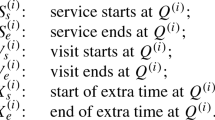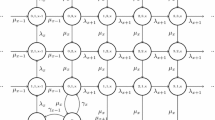Abstract
Polling systems have been extensively studied, and have found many applications. They have often been used for studying wired local area networks such as token passing rings and wireless local area networks such as bluetooth. In this contribution we relax one of the main restrictions on the statistical assumptions under which polling systems have been analyzed. Namely, we allow correlation between walking times. We consider (i) the gated regime where a gate closes whenever the server arrives at a queue. It then serves at that queue all customers who were present when the gate closes. (ii) The exhaustive regime in which the server remains at a queue till it empties.
Our analysis is based on stochastic recursive equations related to branching processes with migration with a random environment. In addition to our derivation of expected waiting times for polling systems with correlated walking times, we set the foundations for computing second order statistics of the general multi-dimensional stochastic recursions.
Similar content being viewed by others
References
Takagi, H.: Application of polling models to computer-networks. Comput. Netw. ISDN Syst. 22(3), 193–211 (1991)
Zussman, G., Segall, A., Yechiali, U.: Bluetooth time division duplex—analysis as a polling system. In: Proc. 1st IEEE Conference on Sensor and Ad Hoc Communications and Networks, 2004
Yeung, K.H., Fung, K.P., Wong, K.Y.: Performance study on disk operations by broadcast polling model. IEICE Trans. Commun. E86B 6, 2012–2014 (2003)
Takagi, H.: Analysis of Polling Systems. MIT Press, Cambridge (1986)
Takagi, H.: Queueing analysis of polling models: an update. In: Takagi, H. (ed.) Stochastic Analysis of Computer and Communication Systems, pp. 267–318. Elsevier, Amsterdam (1990)
Yechiali, U.: Analysis and control of polling systems. In: Performance Evaluation of Computer and Communication Systems, pp. 630–650. Springer, Berlin (1993)
Lévy, H., Sidi, M.: Polling systems: applications, modeling, and optimization. IEEE Trans. Commun. 38(10), 1750–1760 (1990)
Brandt, A.: The stochastic equation y n+1=a n y n +b n with stationary coefficients. Adv. Appl. Probab. 18, 211–220 (1986)
Brandt, A., Franken, P., Lisek, B.: Stationary Stochastic Models. Akademie-Verlag, Berlin (1992)
Glasserman, P., Yao, D.D.: Stochastic vector difference equations with stationary coefficients. J. Appl. Probab. 32, 851–866 (1995)
Bienaymé, I.J.: De la loi de la multiplication et de la durée des familles. Soc. Philomatique Paris Extr. 5, 37–39 (1845)
Galton, F., Watson, H.W.: On the probability of the extinction of the families. J. Roy. Anthropol. Inst. 4, 138–144 (1874)
Kolmogorov, A.N.: On the solution of a biological problem. In: Proceedings of Tomsk University, vol. 2, pp. 7–12 (1938)
Sevastyanov, B.A.: Limit theorem for branching processes of special form. TPA 2, 121–136 (1957)
Biggins, J.D., Cohn, H., Nerman, O.: Multi-type branching in varying environment. Stoch. Process. Appl. 83, 357–400 (1999)
Athreya, K.B., Vidyashankar, A.N.: Branching processes. In: Shanbhag, D.N. (ed.) Stochastic Processes: Theory and Methods. Handbook of Statistics, vol. 19. Elsevier, Amsterdam (2001)
Athreya, K.B., Jagers, P. (eds.): The IMA Volumes in Mathematics and its Applications. Classical and Modern Branching Processes Series, vol. 84. Springer, Berlin (1997)
Resing, J.A.C.: Polling systems and multi-type branching processes. Queueing Syst. Theory Appl. 13, 409–426 (1993)
Groenevelt, R., Altman, E.: Analysis of alternating-priority queueing models with (cross) correlated switchover times. In: Proceedings of IEEE Infocom 2005, Miami, March 2005
Altman, E.: On stochastic recursive equations and infinite server queues. In: Proceedings of IEEE Infocom 2005, Miami, March 2005
Grishenchkin, S.A.: On a relation between processor sharing queues and Crump-Mode-Jagers branching processes. Adv. Appl. Probab. 24, 653–698 (1992)
Núñez-Queija, R.: Processor-sharing models for integrated-services networks. PhD thesis, Eindhoven University of Technology (2000)
Aminetzah, Y.J., Ferguson, M.J.: Exact results for nonsymmetric token ring systems. IEEE Trans. Commun. 33(3), 223–231 (1985)
Lambert, A.: The genealogy of continuous-state branching processes with immigration. J. Probab. Theory Relat. Fields 122(1), 42–70 (2002)
Altman, E.: Stochastic recursive equations with applications to queues with dependent vacations. Ann. Oper. Res. 112(1), 43–61 (2002)
Adke, S.R., Gadag, V.G.: A new class of branching processes. In: Heyde, C.C. (ed.) Branching Processes: Proceedings of the First World Congress. Springer Lecture Notes, vol. 99, pp. 1–13. Springer, Berlin (1995)
Horn, R.A., Johnson, C.R.: Matrix Analysis. Cambridge University Press, Cambridge (1996)
Baccelli, F., Brémaud, P.: Elements of Queueing Theory, 2nd edn. Springer, Berlin (2003)
Bertoin, J.: Subordinators, Lévy processes with no negative jumps and branching processes. Lecture Notes, Centre for Mathematical Physics and Stochastics, Department of Mathematical Sciences, University of Aarhus (2000)
Breiman, L.: Probability. Classics in Applied Mathematics, vol. 7. Addison–Wesley, Reading (1968)
Sato, K.: Lévy Processes and Infinitely Divisible Distributions. Cambridge University Press, Cambridge (1999)
Bertoin, J.: Lévy Processes. Cambridge University Press, Cambridge (2002)
Khoshnevisan, D., Xiao, Y., Zhong, Y.: Local times of additive Lévy processes. Stoch. Process. Appl. 104, 193–216 (2003)
Barndorff-Nielsen, O.E., Federsen, J., Sato, K.I.: Multivariate subordination, self-decomposability and stability. Adv. Appl. Probab. 33, 130–187 (2001)
Gjessing, H.K., Aalen, O.O., Hjort, N.L.: Frailty models based on Lévy processes. Adv. Appl. Probab. 35, 532–550 (2003)
Author information
Authors and Affiliations
Corresponding author
Rights and permissions
About this article
Cite this article
Altman, E., Fiems, D. Expected waiting time in symmetric polling systems with correlated walking times. Queueing Syst 56, 241–253 (2007). https://doi.org/10.1007/s11134-007-9039-4
Received:
Revised:
Published:
Issue Date:
DOI: https://doi.org/10.1007/s11134-007-9039-4




